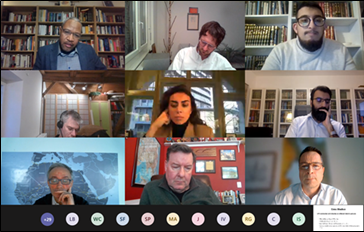Engaging Across Religious Difference
In February 2023, CPI launched in partnership with the Center for Security Studies at ETH Zurich (CSS) a two-year research project on “Engaging Across Religious Difference: Evidence-Based Research on Islamic Jurists Shaping the Actions of Armed Groups and their Ability to Craft Practical Solutions to Conflict”. This project funded by the Templeton Religion Trust (TRT) aims at exploring in five different contexts how do various Islamic jurists interpret Scripture to shape the behavior of armed groups, and which kinds of dialogue engagement allow such jurists to develop, support or legitimize practical solutions to conflict on the level of governance, the conduct of hostilities, or negotiation processes.
This project examines the role of Islamic jurists in five Sunni & Shia armed groups across different conflicts. How do different Islamic jurists interpret Scripture to shape the behavior of armed groups? Which kinds of dialogue engagement allow such jurists to develop, support or legitimize practical solutions to conflict on the level of governance, the conduct of hostilities, or negotiation processes?
Adopting a conflict resolution perspective on the internal decision-making of these groups and on constructive ways of engagement, this project offers policy makers an evidence-based framework for deciding whether, when, and how to engage with armed groups. This creates the possibility of restoring them to the public sphere (e.g. by taking part in political dialogues or negotiations), where they might contribute constructively under certain conditions. Findings will directly feed into parallel dialogue projects supported by the Swiss government. This groundbreaking research contributes to the field by shifting the conversation in policy circles and academia from the theological references of such groups to methods of effective engagement – from a theological problem to be argued to a technical one to be solved.
The focus is on Islamic jurists who are trusted by armed groups because this sheds light on the decision-making & self-understanding of these groups. Albeit highly contested worldwide, these jurists are in a position to define what their groups consider legitimate. Understanding their role is critical for constructive engagement and cross-cultural religious literacy – both of which are enabling conditions of Covenantal Pluralism. In developing an evidence-based understanding of Islamic jurists close to armed groups, we are also beginning to answer Sir John Templeton’s question whether “religious wars” could “vanish if 90 percent of spiritual information came from” verifiable scientific research.






